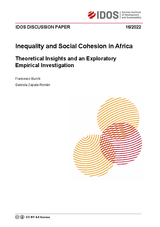Discussion Paper
Inequality and social cohesion in Africa: theoretical insights and an exploratory empirical investigation
Burchi, Francesco / Gabriela Zapata-RománDiscussion Paper (16/2022)
Bonn: German Institute of Development and Sustainability (IDOS)
ISBN: 978-3-96021-195-2
DOI: https://doi.org/10.23661/idp16.2022
Price: 6 €
Inequality is bad per se and has adverse effects, among other things, on economic development and the environment. It is also often argued that high and increasing inequalities put societies under stress, which increases the likelihood of social conflicts. However, the literature on this topic is scarce and some of the conclusions are not adequately supported by empirical evidence. This is mainly because there are different definitions and measurements of social cohesion. Moreover, some definitions of social cohesion incorporate inequality, thus making it impossible to examine how these two phenomena interact with one another.
This paper analyses both theoretically and empirically, the relationship between inequality and social cohesion. To do so, it employs a recent definition of social cohesion provided by Leininger et al. (2021). According to this definition, social cohesion is composed of three core attributes, namely trust, inclusive identity and cooperation for the common good. These attributes are examined in two dimensions, namely the horizontal (relationship among individuals) and vertical (relationship between individuals and state institutions) dimensions of social cohesion.
This paper provides an overview of the empirical evidence regarding the relationship between inequality and the three attributes of social cohesion. We find that while inequality is likely to have a negative effect on all three attributes, the intensity of the relationship may depend on some key mediating factors. Moreover, we highlight the main pathways through which inequality could affect each of the three key attributes.
The empirical analysis focuses on Africa. While there is some work in this field in Europe and Asia, to the best of our knowledge, there has not been any related empirical work thus far that has focused on African countries. To measure the three attributes of social cohesion, we use a database generated by Leininger et al. (2021), which is based on data from Afrobarometer and the V-Dem Institute. Inequality is mainly measured by the Gini coefficient and data are sourced from the World Income Distribution dataset. As expected, our analysis shows that countries with higher inequality usually have lower levels of social cohesion, which is measured by an aggregate index. This negative correlation holds when we analyse the relationship between the Gini coefficient and the three attributes separately; however, the intensity varies. It is stronger for trust (rho=0.25) compared with the other two attributes (both of which have a rho equal to approximately 0.1). Additional investigations point to substantially different results for the horizontal and vertical dimensions of social cohesion. Higher levels of inequality are associated with lower levels of horizontal trust and horizontal cooperation. On the other hand, higher levels of inequality are associated with higher levels of vertical trust and are essentially uncorrelated with vertical cooperation. These relationships remain substantially unchanged when we use measures of income inequality other than the Gini coefficient. Further analyses that aim to explain the puzzling results for the vertical dimension of social cohesion reveal that our findings are not clearly driven by trust in a specific institution and are also not an artefact of the specific data we used. Indeed, we obtain similar results using data from the World Values Survey. At the same time, it appears that the positive relationship between inequality and vertical trust is visible only among African countries, whereas it is not observed at the global level or for other regions. Further research is needed to confirm whether Africa is truly exceptional in this regard, and if so, why that may be the case.
Contact
Cornelia Hornschild
Publication Coordinator
E-mail Cornelia.Hornschild@idos-research.de
Phone +49 (0)228 94927-135
Fax +49 (0)228 94927-130
Alexandra Fante
Librarian/ Open Access Coordinator
E-Mail Alexandra.Fante@idos-research.de
Telefon +49 (0)228 94927-321
Fax +49 (0)228 94927-130




![[Translate to English:] Photo: Alexandra Fante, Bibliothekarin/Open Access-Koordinatorin](/fileadmin/_processed_/f/0/csm__c_Deutsches-Institut-fuer-Entwicklungspolitik_Fante_94ce4fa1ba.jpg)